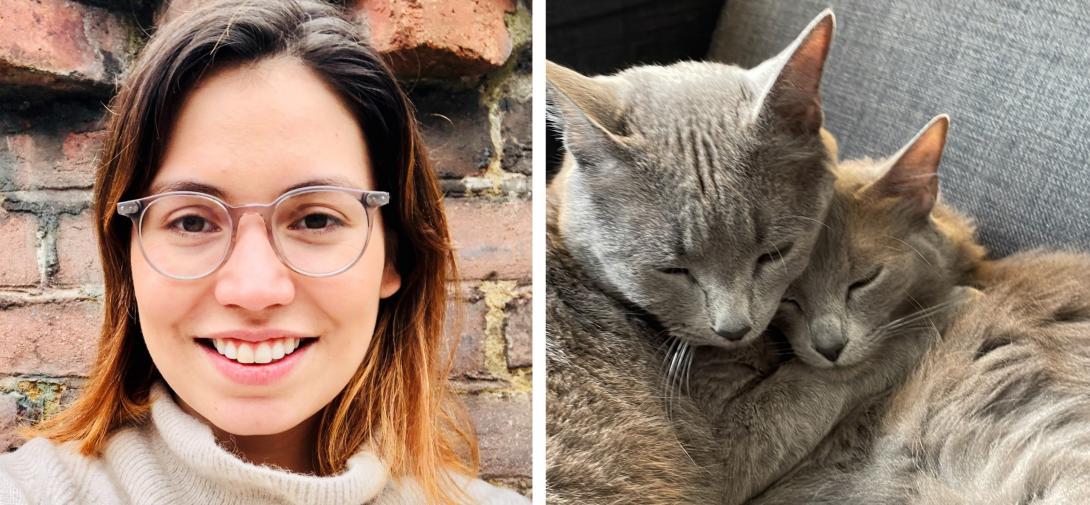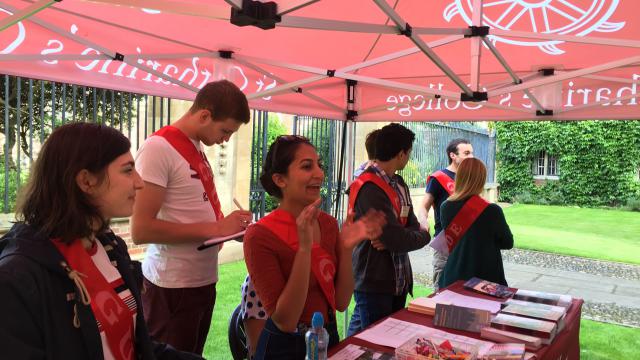Name: Daniela Meneses Sala
Hometown: Lima, Peru
Extracurricular interests: Reading, movies, walking and caring for two cats (Magdelena and Teniente Dan)
Postgraduate degree: PhD in Latin American Studies
Life before Catz
“A lawyer by background, I enjoyed a decade-long career working in journalism: first at El Comercio, Peru’s oldest and leading newspaper, and more recently at Comite de Lectura, where among other things I produced and hosted a podcast on gender. I initially returned to higher education to complete a Master’s in Public Policy at University College London. I realised gender was a theme that I revisited throughout my career and research, which led to me applying for the MSc Gender (Sexuality) course at the London School of Economics and Political Science. This research looked at topics that I’m now incorporating into my PhD, such as critical archive studies, queer archive studies and pets.”
Life at Catz
“I applied to Catz because of the College’s association with the Harding Distinguished Postgraduate Scholars Programme, having been reassured to see that it was centrally located and championed LGBTQ+ members of its small, tight-knit community. The collegiate system is also just one of many ways that Cambridge nurtures connections between people studying different disciplines. My supervisor Dr Geoffrey Maguire is a great example of the multidisciplinary researchers active at Cambridge and working at the interfaces between subjects which you might find siloed at other institutions. I am really looking forward to gaining teaching experience as a supervisor at Cambridge and also recently received CRASSH funding to organise a creative workshop on photos taken from a Peruvian archive, which will be a fantastic opportunity.”
Postgraduate studies
“In my research, I am creating the figure of the Posthuman Feminist Archivist (PFA) and her archive of feelings for and with pets. In the first part of my dissertation, I will explore what characterises this figure and then speculate on how her work of recording, cataloguing and storing images that capture the affective relationship connecting humans and domestic animals would look like. I argue that this archivist and her archive can serve as methodological tool for critical archive studies, and, more broadly, for multidisciplinary studies. I contend that starting with the PFA puts pressure on what we understand can count as a record and as an archive, and that it also signals a way for us researchers to engage in further work of creating material archives. I also engage with the ways in which the PFA and her speculative archive are a methodology that, while building on the work of authors such as Saidiya Hartman, Clare Hemmings and Donna Haraway, stands on its own.
“In the second part of my research, I will engage in the work of materially creating the archive, by working with walking methodologies, with pet adoption activists and with institutional archives. I will then ask what these new archives does for multispecies ethics of care.
“Alongside my studies, I am also writing chapters for two books: the first on gender ideology in Peru and the second on post-feminism and popular feminism in Peru.”
The Harding Distinguished Postgraduate Scholars Programme
“The Harding Programme represents a rare opportunity for international students pursuing transdisciplinary research, which are notoriously hard to find and often limited to specific geographies or subject areas. I was reassured by the extent to which the application process valued creativity and this has also been true now I’m a Scholar: there is flexibility in how I can use my research fund to buy and develop film (which no other funding body would likely support) as well as travelling to conferences.
“I have also benefited from the Harding Scholars network, which encourages you to connect with other postgraduate researchers in different subjects and year groups. For example, I met Lauryn Anderson from the 2021 cohort and together (and with others) we have created ‘Ambivalent Archives’, a popular reading group on archival studies.”
Advice for undergraduates thinking of applying for postgraduate studies
“I hope anyone interested in the Harding Programme will reach out by email to current Scholars – not everyone will have time to answer but I’m sure most will! Applying for PhD programmes can be a daunting experience so try to contact students who succeeded in securing a place and ask to see examples of research statements. For anyone like me, i.e. not coming from a family with a PhD background, it is important to find people you can ask for advice and help.”






